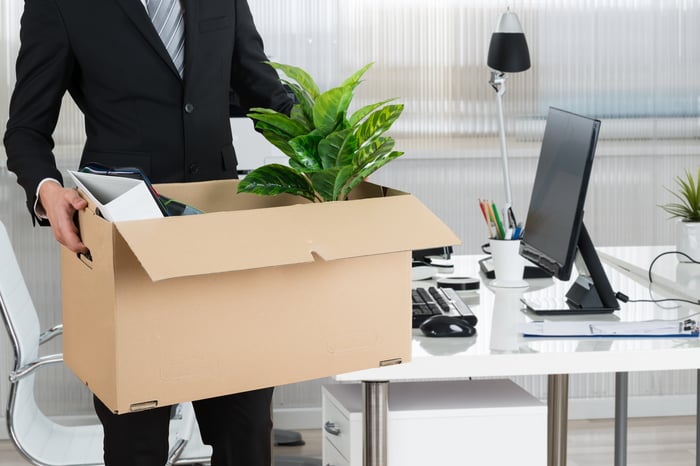Despite the economic slowdown expected from the measures being used to slow the spread of the new coronavirus, the world is not coming to an end. Indeed, there are signs of hope already sprouting. Researchers have found a promising potential treatment using a combination of a decades-old malaria drug and a generic antibiotic. China and South Korea are reporting lowered infection rates. Taken together, these pieces of news suggest that the disruption, while painful, will only be temporary.
With that in mind, the market's massive sell-off from the coronavirus means that now is a great time to consider shopping for stocks with the potential to thrive over time. While this recent meltdown reminds us that money you need in the next few years doesn't belong in stocks, if you've got a longer time frame, these three stocks could even help you send your kids to college.

Image source: Getty Images
An energy titan with a decent method of surviving low oil prices
Valero Energy (VLO 1.57%) is the world's largest independent petroleum refiner, which is a fancy way of saying it turns oil into gasoline. Because it doesn't dig that oil out of the ground, low oil prices merely serve to lower its input costs. Of course, lower gasoline prices also reduce the revenue it receives, but even that's not all bad news. Valero's profits are controlled by the "crack spread" -- the difference between the price of oil and the price of gas and other products made from it.
Available data from the U.S. Energy Information Agency indicates that the recent crack spreads have been within normal levels. In addition, that same agency indicates that gasoline inventories have fallen every week since the end of January, meaning more gasoline has been consumed than produced in that time. That combination means that Valero has a solid path to maintaining profitability even with oil prices suffering at the moment.
Still, a short-term disruption in demand is possible, particularly as people cut back on driving because of quarantines, shutdowns, and social distancing. On that front, Valero's balance sheet shows over $2.5 billion in cash and equivalents and an overall current ratio above 1.4. That combination means the company has the financial flexibility to withstand a temporary disruption in its market and still come out strong.
Looking past 2020, analysts expect Valero to earn around $7.10 per share in 2021. If that comes to pass, investors buying at its recent price of $38.66 will be paying less than 5.5 times those anticipated earnings. Although nothing is ever certain until it happens, Valero is confident enough in its future despite the current challenges that it donated $1.8 million to coronavirus relief efforts. That's not the action of a company that fears it'll go under in the near future.
A company that did some of the bailing out during the financial crisis
It wasn't that long ago that Berkshire Hathaway (BRK.A -2.20%) (BRK.B -2.03%) CEO Warren Buffett was generally criticized for having too much cash despite the booming stock market. Oh, how times have changed, now that the stock market has tanked and bonds have been facing liquidity problems of their own. In a world like that, cash really is king, and Berkshire Hathaway's $128 billion cash hoard looks substantially more valuable than it did when stocks were soaring.
During the financial crisis, Buffett and Berkshire Hathaway used their cash pile to bail out distressed businesses, profiting handsomely when things recovered. It's likely that the company will again do the same this time around, a benefit of having "too much cash" while others carry too much leverage.
Despite having a cash-rich enough balance sheet to bail out other companies, Berkshire Hathaway hasn't been immune from the market's coronavirus carnage. Its shares are down a bit more than 25% from their February highs, and they're trading not far away from the company's book value. Berkshire Hathaway owns and operates a number of critical businesses -- including a railroad, an electric company, and, of course, its insurance lines -- making it likely that much of its revenue will continue to flow.
Think of all the hiring when the world gets back to work

Image source: Getty Images.
One of the biggest disruptions from the coronavirus is that a lot of people have been -- and will be -- put out of work from the businesses shutting down to help slow the spread of the illness. Yet once the immediate danger passes, many of those companies will pick up the pieces and start hiring people back. That could prove to be a boon to employment services provider Kelly Services (KELYA -4.12%) (KELY.B -2.67%).
With a global footprint and contacts among many of the largest companies around, Kelly Services is well positioned to help connect potential employers with potential employees. That could easily lead to an uptick in business once the crisis passes, assuming, of course, that Kelly Services can make it through. On that front, Kelly Services looks like a likely survivor.
The company sports a balance sheet with more in current assets than total liabilities. That basically means that between the cash it has on hand and the cash it has good reason to expect it will receive in the near future, it could pay off everything it owes. Yet despite that solid balance sheet that gives it a great chance of sustaining itself through the crisis, the company is trading at around half its book value.
In addition, analysts are expecting Kelly Services to earn around $2.48 per share in 2021. At a recent price of around $12.47 per share, it's trading at around 5 times those anticipated estimated earnings for next year.
Have a long-term perspective and invest in solid businesses
If your children are already in college or starting it soon, your asset allocation strategy should not be relying on stocks to cover those near-term costs. The coronavirus-induced meltdown is a clear example of why that's a bigger risk than you really want to take. If you have enough time to let the economy and market recover before covering those costs, however, now is a great time to consider investing in solid businesses like these that look capable of surviving and ultimately thriving.




